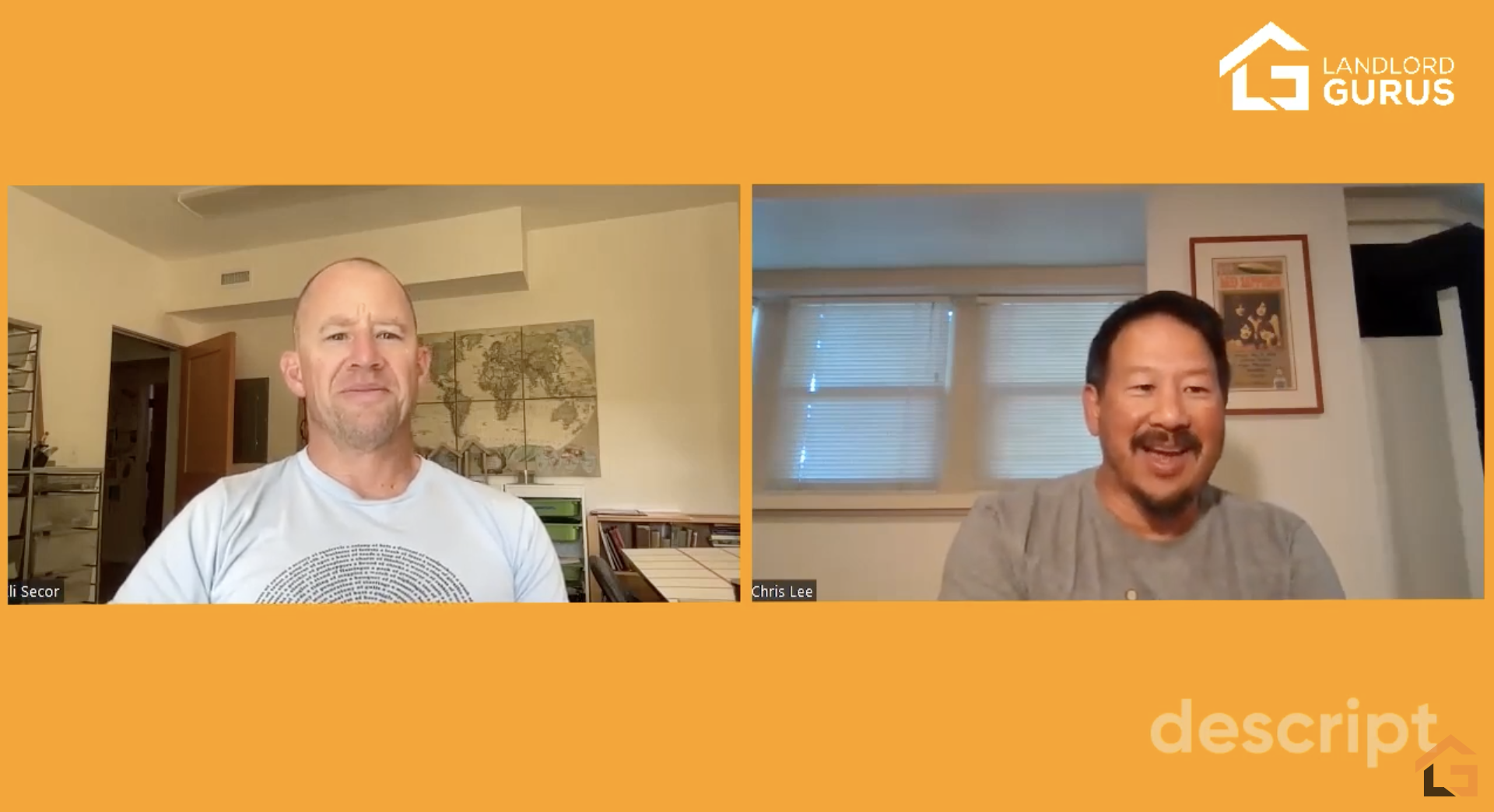In this video, founders Chris Lee and Eli Secor talk about Eli’s experience working with a property manager. They discuss the good, the bad, and the expenses to help you decide whether or not a property manager is for you.
Topics in this video include:
- Why Eli hired a property manager [0:24]
- The cost of hiring a property manager [1:57]
- Eli’s experiences with a property manager [3:44]
- Eli’s takeaway and next steps [13:57]
Transcript
Chris Lee: Hey there. Welcome to Landlord Gurus. I’m Chris. I have Eli here. And we had a couple of episodes recently that talked about whether you should hire a property manager or not and what some of those costs might be. Today we are going to talk about some of those experiences that Eli has had with a property manager.
It’s been, from what I understand, an interesting experience, or eye-opening, to say the least. So yeah, Eli why did you hire a property manager to begin with?
Eli Secor: Yeah. Thanks, Chris. So first off was the factor that the property is a three-hour drive away from here. So I had managed it for 15, 17 years ever since we purchased the place.
I rehabbed it and, you know, I’ve improved every single unit and it was operating quite nicely. But I got to the spot where I was busy with my family and felt like I didn’t have the time, but more so, I wanted to be really careful that I was following the local rules, which are hard to keep up with, and also keeping up with the rents.
So I wasn’t paying quite enough attention, I think, is the gist of it. And, I wanted to see, well, should I open myself up?
CL: Those are all viable reasons like we talked about before. You know, especially, knowing the local rules is something that, a good property manager can bring to the table, and understanding the market to get you, the best rents and basically keep it as occupied as possible without too much vacancy.
Yeah, okay. So you did that and, I guess, how was that experience? You know, how has it been for you?
ES: So this was about three years ago and began during the pandemic. So it started off pretty well and actually went fairly well for the first year and a half or so, and part of that’s that not a lot happened. Part of that is that labor shortage was an issue when they started coming back. I think they had a hard time getting good people.
CL: Sorry to interrupt. When you started with them, all the units, were fully occupied at that point, right?
ES: They were fully occupied. Fairly briefly thereafter, I had one that had to be rented up. Actually, maybe Chris, that’s a spot where I should chime in about what this was costing me.
![]() Also Read: Costs of Hiring a Property Manager – Landlord Gurus Experience
Also Read: Costs of Hiring a Property Manager – Landlord Gurus Experience
CL: Hmm, yeah. And what you had signed up for them to do.
ES: Right. Yeah. And they were very transparent, which, I would absolutely recommend that anybody considering this be really clear, and ask about every single fee that they’re likely to be charged. The big expenses were the monthly management fees that were 8%, right off the top of gross rents. And that’s a pretty decent deal, in a somewhat expensive metro like this, it could easily be 10%. Single families could maybe even be higher, and then they do charge a 50% rent-up fee.
So at any turnover, if it’s a $1,500 apartment, it costs me $750 to fill it. And they do renewal fees of I think it’s about $200. There are some small admin fees that come through at about five bucks a piece. I don’t fully remember what they are. They’re trip fees and for maintenance, and the agents.
Then there are also some markup fees on top of expenses that they put out on behalf of me. And for larger repairs, I think there’s a management fee, which, you know, it might be 50 bucks, to manage dishwasher repair or something. There are layers and it adds up.
CL: Yeah, definitely. Okay. It’s good to know. Definitely take a look at what they’re charging. They all add up.
ES: They were paying for themselves. I have to say that the rents did move up. And of course, that follow through on their part, that’s what the property would bear, which was, you know, by our creation. They improved the gross rents as they renewed and leased up so that it was more than covering the fees.
So at any rate, that is to say, the first year and a half or so, went pretty well. I was okay with the expenses, and you know, things were going pretty smoothly.
CL: Yeah, okay. And, then what changed?
ES: So the factors that changed are the variables that I think are the biggest issues when you’re looking at hiring a property manager. Are they filling vacancies with good tenants quickly? And are they managing maintenance and upkeep matters to the satisfaction of the tenants? And also in a reasonable way in terms of how much it costs, you know, making good decisions. So both of those things went downhill after that initial year and a half.
CL: You were having some issues with the roof, I believe, is that right? And you’d asked them to take care of some patching or things like that. Is that right?
ES: Yeah, so this was a concrete garage and there was a low-tech roof. It was basically tar and it had been redone years ago, and it needed to be redone or at least patched.
So they sent somebody out in the end, I can’t remember frankly, what they got back to me, but it was ridiculous. And I said, no thanks. And then I went and got my own contractor, a handy person that I’d used before, and I said, well have them go out. So there I am, managing.
CL: Yeah. You’re doing yourself then, right?
ES: Yeah. Yeah. And it was a third of the cost or something to that effect.
CL: Wow, okay. So they just, didn’t have the same, I guess attention to the price or, you know, the people they were using, they were just taking that estimate kind of at face value without sort of shopping around or really understanding what the true cost might actually be.
ES: Yeah. And I think it’s a tricky thing, to have kind of the embedded interest that you have as, an owner. A property manager will try to do that, but it’s a different thing. And also, you do need somebody involved who knows enough about maintenance that they can triage a bit upfront, even just by phone or photos. So that they send the most effective vendor first. You can either know that like I do or have good resources, in terms of a trusted handy person. That’s kind of the best of both worlds, somebody you can call on.
CL: Yeah. No, that’s a good point. Okay, so you basically took care of the roof thing yourself. You also had some issues—was there some flooding in one of the apartments as well?
ES: Yeah, we had a big freeze over the winter and a pipe burst in a laundry room, which was inside but not insulated. And so it flooded the basement unit which was all carpet, on concrete.
So I know from experience that you’ve gotta lift the carpet and get a fan under it so that it dries everything out before the trapped water starts to mildew. But I had to tell them that.
CL: I assume the tenant contacted the property manager when they first noticed the issue.
ES: They did, yup. Then I think the property managers asked me, “Well, what do you want to do?” And I said, “Well, you gotta get it dry.” So they sent a vendor out and the vendor said, well, we can go and do something and it’ll cost a thousand dollars, and that was just an estimate. But it’ll cost you something starting at a thousand dollars, is basically what it was.
CL: And with your knowledge, you knew that that could be done for a lot less.
ES: Yeah. I said, “Here’s a link to the $129 floor-drying fan at Home Depot. Please go get it. Have your maintenance people take it down, lift up the edge of the carpet, stick it underneath, and keep blowing until it’s dry.”
So they said, “Oh, great idea.” But that still took 10 days.
CL: Oh my goodness.
ES: Yeah. And to be fair, everything was frozen, everything was a mess. There were problems all over the place. So some of it’s understandable, but, you know, the communication wasn’t good with me or with the tenant.
CL: Right. I mean, and after 10 days, then, I assume mildew and mold had already started to settle in.
ES: Yeah, it never popped up as an issue. But there’s definitely, a risk of that for sure.
![]() Also Read: Mildew and Mold in Rental Properties: Video Extra
Also Read: Mildew and Mold in Rental Properties: Video Extra
CL: And then did you end up, eventually, at the end of the day just ripping out the carpet and putting new flooring in? Or am I getting stories confused?
ES: They’re not related, but they did happen close to each other. So a few months later, early this year, I had a vacancy. That tenant moved out after 12 years. He’d been a great tenant and the place was in great shape, but the carpet was 12 years old. So I decided, alright, we’re going to put down a luxury vinyl plank flooring, which is all the rage and is great, durable stuff, I have to say.
I said, “Okay, well, let’s get that stuff out of there.” So I went down there being a person who likes to control big decisions like this, and I went to the flooring store and I picked out the stuff and I got a list of vendors from them and they showed me a couple that they thought might be good.
And I called around and I found somebody that seemed really reasonable. And then I put him in contact with the property manager so that he could get access to go and estimate the labor part of it. Well, we had snafu after snafu. The keys weren’t there the first time. They put a code out the second time, but it didn’t work or they didn’t clarify the right door. There was some error on his part, but he couldn’t get ahold of them either.
So then he said, understandably, “Thanks, but no thanks. This is too much of a hassle.”
CL: Wow. Yeah, that’s understandable. I mean, it cost him a couple of trips out there.
ES: Yeah. And the fact that in this market he did the second one is amazing actually.
CL: Right. And all that could have been avoided with a property manager who was responsive, or at least a little bit more on top of it.
ES: They moved the keys for some reason that I still don’t know.
CL: So, yeah, I mean, it sounds like you had to be involved kind of on all these issues along the way as if you were managing it yourself, you know, more or less, not a hundred percent, but yeah.
ES: It was my choice to go and choose the flooring. And anytime the client gets involved with somebody else’s job, you have multiple parties involved. I knew that, but I tried to be careful about it. But they were not on top of it and it didn’t go well. I had to do more than I should have had to by far.
CL: And my guess is that this delayed installation of the project probably kept it unoccupied for longer than you would’ve liked. And that cost you money?
ES: Yeah. 2, 3, 4 months probably, by the time we got it figured out. Cause I escalated things then. I ended up with the general manager and she said, “Well we gotta get this fixed.” So we worked together and she was very responsive. And they said, “Well, our maintenance person can put it in and they can start on Monday.”
I said, “Well, great.” They’d estimated $1,200. I didn’t know until a month later that it was costing me $3,800. I’m sorry, $2,800. It’s not quite that outrageous. It was over double.
CL: Wow. Okay. And that’s using somebody in-house even?
Well, I mean that’s another interesting issue with property managers is that you might sign off on a project and then give them full access, but you might not know the total cost until the end.
Or in a lot of cases, any repair that is below a certain threshold, they do not have to get your approval.
ES: Yeah.
CL: So you don’t know about it until after it’s done, and then it adds up if there’s, you know, multiple that are all below the threshold.
ES: Yeah. That adds up. The bigger issues for me have been the big things. So yeah.
CL: Just another thing to be aware of. Again, back to the costs, there are a lot of things that come up and that seem to crop up.
ES: Well, right. I guess that’s a good thing to acknowledge that not only are there costs of the property manager, there can be associated costs with things not being done the most effective way.
Then, to move on, then that unit was ready to be leased. And I’ll air quote the ready, a month or a month and a half later we’d done some painting. We put the place in really nice shape, and they said, “Okay, well we’re ready to go. Here’s the price we think.”
And it was a lot. It was double what I had been getting before I hired the property manager. I was clearly quite low on that one. So I said, “Well, great, you know, go to it.” They’d report every week, and they weren’t getting many leads and they weren’t getting any applicants.
So they would report to me each week and we moved the rent down a couple times. And then eventually I said, “Okay, well I’m going to go down and I’m going to see what is going on.” I had another project to do there as well. So I got there and there’s some stairs down—it’s concrete—and stairs down with a roof. There were cobwebs and the stairs had leaves on them and were dusty. Then I went in and people clearly had been tracking all that stuff in. And it just wasn’t clean. I don’t know if it had been cleaned poorly. It was very poorly cleaned—if it was cleaned at all—my guess would’ve been no.
CL: We’ve talked about this before. We’ve talked about, you know, how to show your listings and how to make it presentable and, you know, all this matters. It’s the first impression that these potential tenants see. And if it’s not clean, if it’s just in its state of disrepair, it’s just a bad impression and sets a bad precedent too.
ES: Well, right. Are you going to get somebody who thinks that that’s what they deserve? Or that is comfortable with that level of grime.
That’s not good for the property long term. So there were a couple of other things, the backyard was a mess, and so I sent them a list of things to do. I talked to the other tenants and I sent them a list of the things that they had wanted and asked them and followed through to get all that stuff done.
And sure enough, a week later, the place had an applicant that they had accepted. One other change though, was that in the other units, they had implemented, with my consent, a pet policy. Under 45 pounds and there are some restrictions, and they do this thing called pet screening.
![]() Also Read: Best Ways to Increase Rent: Collect Fees for Pets in Rental Property
Also Read: Best Ways to Increase Rent: Collect Fees for Pets in Rental Property
And, I generally don’t take pets, but I allowed them to do that. And, I think you can get better revenue when you do that carefully. But they hadn’t advertised this unit, which is a basement unit and the most impervious to damage of any of the units. So, of any unit, it would’ve been the best one to have a pet. For some reason, they hadn’t done it there, and I didn’t know that.
And so that, I think, made as much difference as anything else. So, at any rate, you know, things that have just fallen apart.
CL: Yeah. It seems like there’s just a level of attention that has kind of fallen down. Which, you know, I guess it can happen, but that seems like, if they’re managing multiple properties and they got a lot of things to do, and especially like you mentioned earlier, with labor shortages, it just might be hard for property managers to stay on top, of everything that they’re supposed to.
And that’s not an excuse, but I think it’s just the reality that is what’s happening.
ES: We all know this is a hard job. That was why I hired him. And I think labor shortage and coming out of the pandemic. There are some ways that I’m sympathetic and I don’t think that every property manager, or even necessarily this company, over the long haul is really just inherently problematic.
But you have to know everything you’re getting into. Ultimately it’s more efficient to manage your own because you got a minimum of eight to 10% of your gross revenue right off the top, and that’s before anything else happens, right?
CL: Yup, okay. So what’s your takeaway from all this? What are your next steps? Are you going to keep with this property manager? Are you looking at taking it on yourself? What next?
ES: Well I started talking to our realtor to consider doing a 1031 exchange of the investment to somewhere else closer where I can manage it.
And as an aside, I’ll say that it’s in one of these tough markets where the laws are really onerous, and that’s a factor for me too, but not enough by itself to make me get out. So I think we probably aren’t going to sell it right now for a number of reasons, but I think I will take it back in the next couple of months.
And along with that, I’ll need to dedicate time to stay on top of the market. So I’m getting market rents, on top of the laws, so that I’m doing renewals correctly, and lease-up correctly. Which I do here in Seattle. I have to stay on top of it, so I’m accepting that I have to do that if I take it back.
CL: Got it. Okay. Well, yeah, all things to consider, it can be a tough choice, and we’ve got Eli’s experience with that which may help influence anyone’s decision out there as well. So anyway, we’ll wrap up there. Thanks for telling us your story. It sounds not fun.
ES: It’s been harrowing recently.
CL: That’s for sure. Yeah, if anyone else has any experiences like this, leave them in the comments below. We’d love to hear your stories as well. Or if you’ve had a positive experience, let us know too.
ES: Definitely.
CL: Yeah. All right, well, thanks. Like, subscribe, share.
ES: Thanks.
CL: Bye.
Disclosure: Some of the links in this post are affiliate links and Landlord Gurus may earn a commission. Our mission remains to provide valuable resources and information that helps landlords manage their rental properties efficiently and profitably. We link to these companies and their products because of their quality, not because of the commission.





Great video. A lot of insight into the real world of hired property managers.